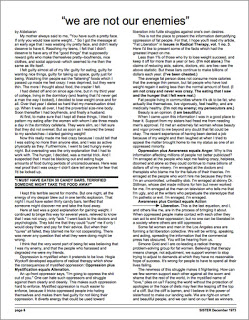This eighth post of the series marks the end of the period when the earliest foundations for fat activism as I understand it in my book were put in place.
Radical Therapy was an offshoot of the anti-psychiatry movement as it manifested in the 1960s. This movement had many concerns and approaches, and histories that stretched back to the earlier part of the 20th century. By 1967 theorists and activists were arguing that psychiatry was a suspect science and that mental health services were oppressive. Radical Therapy was a practical critique of the mental health system, which was seen as perpetuating oppression and inequality and acting in the interests of a corrupt dominant culture. Radical Therapy sought to reformulate mental distress as an understandable response to living in oppressive societies. Social justice and social change were understood a means of addressing and healing mental pain. This analysis proposed that people’s mental health problems were political and not organic, inevitable, or produced by the individual.
Anti-psychiatry has been heavily criticised but it remains a useful means of understanding the uses of mental health services to profit from, discipline and punish marginalised people. There’s still a reluctance in the therapy world to think of therapy as a political act saturated with power. See the excellent documentary And This time its Personal Psychocompulsion & Workfare, for example, a response to the introduction of therapy in British Job Centres to harass people unable to work. Its insistence on acknowledging the diversity of cognitive experience resonates too with the more recent Mad Pride movement which again overlaps with disability politics.
Despite the strength of its critique, in an article published in State and Mind in 1977, Aldebaran disclosed that Radical Therapy, like mainstream therapy, remained hostile to fat people, and that fat liberation was regarded as a dangerous luxury. Writing to the fictional composite Dr Hurvitz, she says, presciently:
“You said, ‘Fat liberation may be fine for you, but I have a client in therapy who has to lose 50 pounds or she’ll die of diabetes.’ You also said the real issue in fat liberation ought to be the ‘right to be fat,’ and that I should put more emphasis on ‘Fat is Beautiful.’ I’ve tried to figure out why those comments make me feel so queasy. Certainly we must come to love ourselves and assert our right, as fat people, to be. But what I come up with is that you want a nice liberal discussion about freedom and beauty, while you and I both know that the most urgent issue is death – the pain and death of fat people. You see fat as suicide, I see weight loss as murder – genocide, to be precise – the systematic murder of a biological minority by organised medicine, acting on behalf of the law- and custom-makers of this society. We differ only in our opinion of what causes fat people’s early deaths.”
Nevertheless, Los Angeles Radical Feminist Therapy Collective was where Aldebaran presented her preliminary findings about why people might be fat. It was through this work that an early social model of fat was developed: the idea that the real problem is not the fat person, but the society that hates us. In 1973, she published a piece in Sister explaining the theoretical connections between Radical Therapy and fat liberation and announcing the formation of a group to explore this. Feminist Radical Therapy is what helped incubate Aldebaran’s ideas and provide the spark that later became fat feminism through community knowledge-sharing, consciousness-raising and understanding social contexts in which problems are located.
Daily aggressions, self-blame and self-hatred continue to contribute to fat people’s mental distress. We know as activists that challenging oppression improves fat people’s lives. But there is little impetus at the moment to generate the empirical evidence demanded by mental health services to include activism as part of a no-risk, cost-effective repertoire of treatment and support. Fat people’s mental health needs remain underserved in a context where normalisation through (profitable) weight loss remains the ultimate therapeutic goal. And of course this is rarely seen as a political issue.
Aldebaran (1973) ‘we are not our enemies’, Sister, December, 6.
Aldebaran (1977) ‘Fat Liberation – A Luxury? An Open Letter to Radical (and Other) Therapists’, State and Mind, 6, 34-38.
(c) Obesity Timebomb – Read entire story here.
